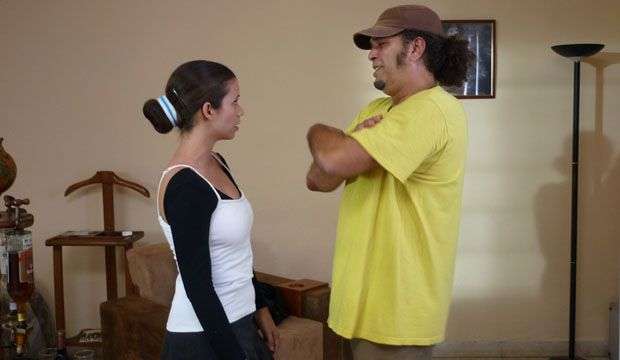For the last five decades, the act of enjoying the newest films in the major theaters on the island, accompanied by short films and domestically produced documentaries, became a fact of life for the Cuban public. A tradition that dates back to the years in which the presence of Latin American ICAIC Newsreel and the most remembered Filminutos (animated) were also sufficient grounds for the reunion of the spectators with the big screen.
This summer, the Cuban Institute of Cinematographic Art and Industry (ICAIC), happily takes on a stable way that ancient custom, absent in recent years. During the summer months they will exhibit 18 works by 14 established and new filmmakers of Cuban cinema, which will serve as a prelude to anticipated films of diverse film premieres, a sign of the return to the country film circuit of short films, cartoons and documentaries to their natural space-we could say.
As part of this program are included the short Exit (2011) Casting (2013), recent productions of the controversial actor, narrator, Cuban writer and director Eduardo del Llano. Two films in which the camera is not too risky, there is not a display of visual effects, or to attempt to revolutionize the structure. This is a way of telling and reading the traditional way, where the director does not think of innovating, but rather peering into the human psychology and social processes that surround him.

In these audiovisual works we find, once again, that ironic and acerbic look that characterizes the author of the feature film Vinci (2011). An intelligent and questioning humor, that invites to catharsis and reflection on the most burning problems of Cuban society. On this occasion, his arrow lands on the target of the ethics of the artists in Cuba today.
Nicanor O’Donell, fetish character and alter-ego Eduardo del Llano, returns in his short Exit. This time, the character played by actor Luis Alberto García, is transmuted into a sort of “executioner employee” under the orders of a foreign artist trying to capture the pain of Cuban artists (as a metaphor for his creative anxieties). O’Donnell, under such conditions, will have no other choice but to punch a long list of cultural personalities in the face.
Thus he directs his questioning look towards those foreign artists who, unscrupulously manipulate and interwoven Third World realities with “artistic” formulas they would never have a place in their first world countries. At the same time the film railed against those Cuban artists who feel the “need to transcend the world of art” … at any cost.
Meanwhile, Casting, tries faithfully to reproduce a screen test where several actors aspire to play a character in a Cuban-German co-production. Their different personalities come to the surface, and the infighting that such competitions bring out. It is a kind of metaphor, that through this story and the human misery of the characters, trying to reveal the inner world of the artists, their motivations, uncertainties, contradictions and frustrations. But not only the actors: it also delves into the ethics of the artists behind the camera, that face financial hardship, are able to violate any moral guideline provided for carrying out the project. It is a story about the coexistence between worthy and necessary, and on the levels of a simulation structure that goes beyond the mere sight of the “film within a film”.
Writer of such renowned titles-while controversial- institutional Cuban films like Alice in wonderland of Daniel Diaz Torres, Life is whistling and Madrigal de Fernando Perez and Ana’s film by Daniel Diaz Torres, Eduardo del Llano has dabbled in the direction in multiple short films with his independent production company Sex Machine Productions: Monte Rouge, High Tech, Photoshop, Homo Sapiens, Intermezzo, Brainstorm, to name a few. Shorts characterized by excruciating socio-cultural criticism, with an ironic and acerbic look, accompanied by a peculiarly Cuban humor used to dissect our reality, characteristics that earned him in the past quite a few detractors.
Fortunately, it appears that the burdens of the past are giving and short films like Casting and Exit return to find a place in the theaters on the island. Enforcing the motto of who was one of the leading filmmakers of Cuba, Tomas Gutierrez Alea (Titon ), who always argued that “to love a country means also to exercise critics.”

For: Amanda Guerra










